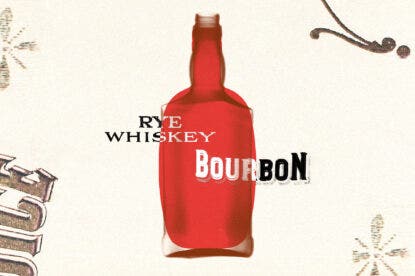The selling and marketing of whiskey sometimes includes the phrase “cask strength.” These words are placed on select bottles to make them stand out to consumers ordering drinks at bars or shopping at brick-and-mortar or online stores.
As legal definitions vary (or simply don’t exist), putting the words “cask strength” on a bottle can be a superficial designation. In many cases, it signifies exclusivity, or some sort of direct access to a barrel-strewn whiskey tasting club. However, it can also refer to a spirit bottled directly from the barrel in which it was aged, with no water added to adjust the proof—something also commonly called “barrel proof” or “barrel strength.”

“I think most distillers would agree that a cask-strength whiskey is where the alcohol by volume of the finished, bottled product is the exact same as the abv of the liquid of the casks that they were sourced from,” says Matthew Hofmann, managing director and cofounder of Westland Distillery. “Or even more simply, it’s undiluted whiskey.”
Key factors that affect whiskey’s strength, or alcohol by volume (abv), and flavor within its cask: the type of barrel used, such as new oak versus an older barrel, and the type of wood the barrel is made out of, like American, European or Japanese oak (Mizunara). These factors affect how a particular wood reacts with, and to, the alcohol inside.
Spending time in contact with wood also contributes aromas, flavors and a slight amber hue to a spirit. The charred wood inside the barrel absorbs rough notes left over from distillation, much like a Brita filter does with tap water. And since wood is permeable, whiskey can absorb oxygen, as well as adapt to shifts in temperature and metamorphize from a clear liquor to the familiar brown spirit most of us know as whiskey.
Most whiskeys are diluted slightly and sold at 40–45% abv (80–90 proof). Cask-strength whiskey is usually bottled at 50% abv (100 proof) or higher.
Conor O’Discroll, Heaven Hill Distillery’s master distiller, believes the distinction can help demonstrate a brand’s caliber or distiller’s skill.
“With 1.9 million barrels of aging inventory, our barrel proof offerings allow the consumer to experience our whiskey in its purest form,” he says. “Barrel proof whiskeys are a showcase example of our expertise as distillers, as well as the consistency of quality and craft across our portfolio.”
“Barrel proof” was defined in the U.S. in 1977 through a ruling by The Bureau of Alcohol, Tobacco and Firearms (ATF) and additional rulings by the Alcohol and Tobacco Tax and Trade Bureau (TTB) have since aimed to expand definitions to include the term cask strength. Countries like the U.K. also have their own regulations on certain phrases regarding bottling proof in products like Scotch, though given the breadth of global spirits producers and similar-sounding phrases that can occur on a label, specifics can be hard for regular consumers to pin down.
“In my opinion, cask strength whiskies bring you a closer look at how a master distiller has honed their craft.” —Michael Vacheresse, Travel Bar
Michael Vacheresse, the owner of Travel Bar in Brooklyn, New York, which serves more than 400 whiskeys, agrees. “In my opinion, cask strength whiskies bring you a closer look at how a master distiller has honed their craft,” he says.
Vacheresse believes there are other benefits for consumers, too. “Higher proof whiskey allows the consumer to ‘proof down’ their pour to the proof that they enjoy.”
Still, he notes that terms like “cask strength” can be confusing as they don’t denote any specific abv or proof.
Robin Robinson, author of The Complete Whiskey Course, has a similar line of thought.
“It is the height of current drinking fashion,” says Robinson of the term cask strength. “In many ways, it’s part of the ‘individualization’ of distilled spirits, effectively telling the distiller, ‘We don’t trust you to proof it down to my liking.’
“On the other hand, it makes a great buying value: If you tend to use water when you drink it, you’re essentially buying more than the 750-ml you paid for,” he says. “But if you’re drinking it straight all the time, you may need to seek professional help.”
Last Updated: September 28, 2022















